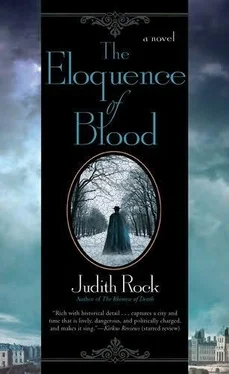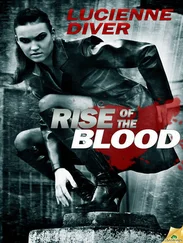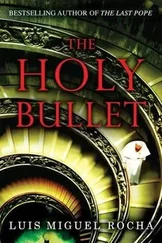Judith Rock - The Eloquence of Blood
Здесь есть возможность читать онлайн «Judith Rock - The Eloquence of Blood» весь текст электронной книги совершенно бесплатно (целиком полную версию без сокращений). В некоторых случаях можно слушать аудио, скачать через торрент в формате fb2 и присутствует краткое содержание. Жанр: Исторический детектив, на английском языке. Описание произведения, (предисловие) а так же отзывы посетителей доступны на портале библиотеки ЛибКат.
- Название:The Eloquence of Blood
- Автор:
- Жанр:
- Год:неизвестен
- ISBN:нет данных
- Рейтинг книги:5 / 5. Голосов: 1
-
Избранное:Добавить в избранное
- Отзывы:
-
Ваша оценка:
- 100
- 1
- 2
- 3
- 4
- 5
The Eloquence of Blood: краткое содержание, описание и аннотация
Предлагаем к чтению аннотацию, описание, краткое содержание или предисловие (зависит от того, что написал сам автор книги «The Eloquence of Blood»). Если вы не нашли необходимую информацию о книге — напишите в комментариях, мы постараемся отыскать её.
The Eloquence of Blood — читать онлайн бесплатно полную книгу (весь текст) целиком
Ниже представлен текст книги, разбитый по страницам. Система сохранения места последней прочитанной страницы, позволяет с удобством читать онлайн бесплатно книгу «The Eloquence of Blood», без необходимости каждый раз заново искать на чём Вы остановились. Поставьте закладку, и сможете в любой момент перейти на страницу, на которой закончили чтение.
Интервал:
Закладка:
She looked away and drained her glass.
“Renee, it seems certain that Saglio did not kill Mademoiselle Martine Mynette. But he thinks this Tito may have killed her.”
She made a sound like steam escaping from a pot. “Saglio is a spider. He is an animal. Tito had been gone a month and a half. He would never have come back to the house as long as I was there. He knew I’d make him regret it!”
Charles made a noncommittal sound and watched the cook by the fire pour white wine into a third glass for Damiot, who was eagerly holding out his hand. Renee took her glass to the cook to be refilled.
Charles said, “How long had you worked for Mademoiselle Anne Mynette?”
“About three years.”
“And how long had Tito been there?”
Renee sighed and drank deeply. “Since he was a child, eight years old. It was like this. Therese, the cook in the Mynette house, the thief I told you about-she said that Mademoiselle Anne took him from the foundling home to be her servant. It was an act of charity. She gave him a way to earn his living and a better growing-up than he would have had.” She shrugged. “But she soon discovered he was a liar, Therese said. Mademoiselle Martine was about four years old then, and she always wore around her neck a little red heart on an embroidered ribbon. And-”
“Mademoiselle Brion told me that this necklace was missing when you undressed Mademoiselle Martine for her coffin.”
“Yes. Mademoiselle Brion was running everywhere, looking for it. I didn’t see how a trinket could matter when my mistress was lying there dead. Well, as I was telling you, when Tito came to the Mynette house as a child and saw Martine’s necklace, he grew very angry. He said it was his and tried to snatch it from her neck! Mademoiselle Anne beat him for it and almost sent him back to the foundling home. But she gave him another chance and he turned out to be a good worker, so she kept him. And finally the little liar stopped saying such foolish things.”
“Do you know where he is now?”
“No.”
“Paul Saglio described him as middling tall, dark haired, and well fleshed. Is that right?”
She shrugged. “I suppose so. Yes, that’s-”
She broke off as the liquid-eyed waiter Charles had met when he was there with La Reynie burst into the kitchen. “Madonna says chicken pies,” he yelled at the cook. “She says fruit pies! Cakes and cream, she says, maybe that will quiet them!” He gasped as his eyes fell on Charles and Damiot. “You! No! Go, go,” he hissed, waving his arms at them. “If the signores in the cafe find you, they will kill you for murdering everyone! Go!”
Beyond the door, a surge of argument rose and chairs scraped across the floor. The counter woman screeched furious reprimands. Then, “Luigi what are you doing? Get out here!” Her voice was coming toward the kitchen. Casting dignity to the winds, Charles and Damiot ran for the courtyard and their horses.
“What a pleasant rest,” Damiot said darkly, as they rode along the lane toward the Fosses St. Germain. “I hope we can get back to the college without more of that.”
“We’re not going back yet; we’re going to the Foundling Hospital. Where is it?”
“We’re going home.”
“You go home. Where’s the Foundling Hospital?”
“I cannot go back to the college without you; the rector will have my head.”
“Then take us the quickest way to the Foundling Hospital.”
“No. I am your superior. Going there is pointless. This Tito was there years ago; who will remember him? And what good would it do, if they did?”
“The rector is your superior, and he ordered me to find these killers.”
Damiot breathed ominously and silently through pinched nostrils. “There are two Foundling Hospitals. Do you want infants or older children?”
“Older, I think.”
“Then we go across Paris. All the way across Paris. Out the rue St. Antoine to the faubourg. Where I devoutly hope the populace is not starting its year arguing about how much better the world would be without Jesuits.”
In a loud silence, they rode across the river and turned east. In spite of the cold, holidaymakers strolled along the rue St. Antoine in their best clothes. The bourgeoises wore sober black and gray and brown, but their inferiors were bright against the snow in reds and yellows and greens rarely seen on workdays. Fastrolling carriages flashed by. Street peddlers bellowed the virtues of their hot coffee, chocolate, small pies and cakes, and smiled under a rain of small coins. Charles wanted to buy something to eat, but Damiot curtly refused and Charles decided not to argue. Most people ignored them, though as they rode past a snowball fight, a few angrily flung snowballs came their way; harmlessly, however, since the throwers’ holiday drinking was influencing their aim.
Just past St. Catherine’s well, at the Jesuit church of St. Louis, Charles put out a warning hand to Damiot and drew Flamme to a sudden halt. The beggar Marin, hatless but wearing his green almsgiving coat, already torn and dirty, was sitting on the church steps and holding out an insistent hand to passersby.
“Give alms, for love of the Sacre Coeur! Give alms for the Sacred Heart, have luck all year,” he chanted, scowling blackly at anyone who ignored him. “Refuse, you’ll have a year of tears! Give alms for love of the Sacre Coeur.”
Charles saw that tears were running down Marin’s face. The people who dropped coins into his hand kept a tight eye on his massive walking stick, careful not to come too close. His long, tangled white hair and beard made him look like a prophet, and he seemed not only at the end of his patience, but nearly as distraught as when Charles and Mme LeClerc had seen him following the mules on the rue St. Jacques.
“Blessed Sacred Heart,” he mourned, his voice rising in a wailing lament. “God and all the saints forgive me, blessed Claire, forgive me
…” He began to beat his chest. “Sacred Heart, see my tears-” The words trailed off into keening and he rocked himself from side to side.
Charles got down from his horse. Leading Flamme, he went as close to Marin as he dared. “Marin, softly, hush, it’s all right. God forgives you.” He put a hand gently on the beggar’s shoulder. “Claire forgives you, the Sacred Heart forgives you.”
The old man’s eyes flew open and he pulled away. His tears stopped and he stared wordlessly up at Charles, his eyes full of fear.
“What is it, Marin? You know I won’t hurt you.” Marin’s eyes darted from Charles to the street. “Where is Jean, Marin? Is he here to take care of you?” There was no answer. Charles looked in vain for the beggar’s keeper and then took money from the purse the rector had given him and put coins into Marin’s gnarled hand. “For your supper and Jean’s, too. Come now, get up, you can’t stay here. You may not remember Christmas Eve, but if the Professed House rector sees you here, he’ll surely remember and give you to the archers.”
Charles was pulling Marin to his feet when the old man froze, staring past him. Then the beggar lurched upright, ducked away from Charles, and fled. Turning to see what had frightened him, Charles saw Lieutenant-General La Reynie, imposing in a black-brown cloak and a wide beaver hat with a white plume, coming toward him. Behind him marched a solid phalanx of a dozen or more men in thick brown coats and breeches, with pistols in their belts.
Pere Damiot, his back to the approaching police, said impatiently, “If we have to go to the Foundling House, let’s go and get it over.” Even the stolid Boeuf was shaking his reins, wanting to be gone.
Charles raised his eyebrows. “Turn around, mon pere,” he said quietly, “and you’ll see why we can’t leave just yet.”
Читать дальшеИнтервал:
Закладка:
Похожие книги на «The Eloquence of Blood»
Представляем Вашему вниманию похожие книги на «The Eloquence of Blood» списком для выбора. Мы отобрали схожую по названию и смыслу литературу в надежде предоставить читателям больше вариантов отыскать новые, интересные, ещё непрочитанные произведения.
Обсуждение, отзывы о книге «The Eloquence of Blood» и просто собственные мнения читателей. Оставьте ваши комментарии, напишите, что Вы думаете о произведении, его смысле или главных героях. Укажите что конкретно понравилось, а что нет, и почему Вы так считаете.












